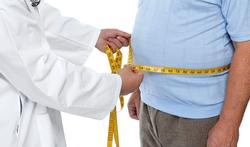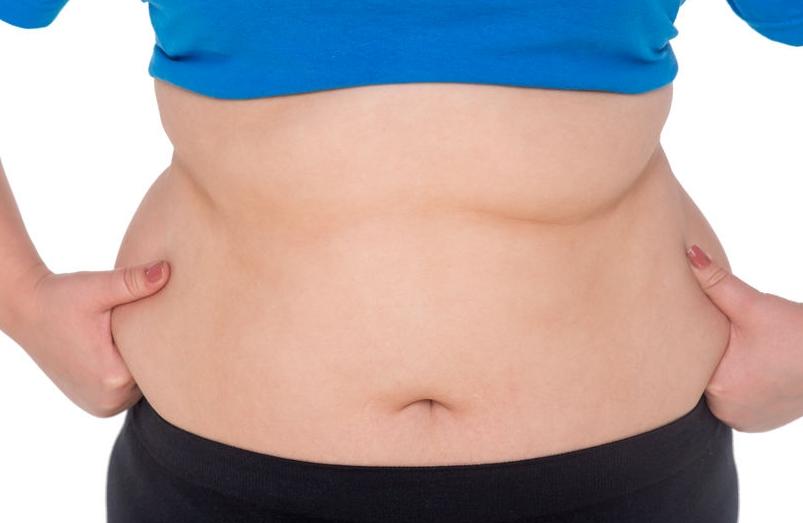Many women in the transition phase or perimenopause (those are the years preceding the menopause) have a hard time losing weight or even keeping their weight. To do this, their hormonal balance is firstly pointed out, because it changes considerably during midlife. In particular, less estrogen is produced - that is the female hormone - and that estrogen saving has an important influence, both on the body and on the mind.
One of the physical consequences is weight gain, but it is actually due to the combination of a number of factors: muscle mass decreases and metabolism slows down, resulting in fewer calories being burned. On top of that, there is also a redistribution of the fat reserves that are mainly targeted at the waist and stomach.
The ideal circumstances to make you a few kilos thicker and rounder ...
A slower metabolism
Middle-aged men also often suffer from a (slightly) rounder abdomen and waist, especially if they do not exercise or exercise enough. That is the proof that not only the hormonal changes are at the basis of the extra kilos in women. It is mainly the delayed metabolism and the change in the muscle and fat mass ratio that are the breaker, so also in men.Often it also has to do with a lack of exercise, the phasing out of sports activities or a changed eating pattern. But you can still gain a few kilos even if nothing has changed in that area.
How much belly fat is acceptable?
 We all have belly fat, even if we don't have a belly. The belly is one of the places where our body stores excess fat. Other storage rooms for such storage are buttocks and hips. Part of the fat is fixed under the skin, part is deposited deeper into our body and we call that visceral fat. We need a little visceral fat to protect and pamper our organs, but too much is detrimental to health. It increases the risk of high blood pressure and the development of diabetes, dementia, cardiovascular diseases and a number of cancers. It also disrupts the fat balance in the sense that it leads to an increase in triglycerides and a decrease in HDL cholesterol or good cholesterol.
We all have belly fat, even if we don't have a belly. The belly is one of the places where our body stores excess fat. Other storage rooms for such storage are buttocks and hips. Part of the fat is fixed under the skin, part is deposited deeper into our body and we call that visceral fat. We need a little visceral fat to protect and pamper our organs, but too much is detrimental to health. It increases the risk of high blood pressure and the development of diabetes, dementia, cardiovascular diseases and a number of cancers. It also disrupts the fat balance in the sense that it leads to an increase in triglycerides and a decrease in HDL cholesterol or good cholesterol.
With a scan the amount of belly fat can be precisely measured, but you can also check yourself if your visceral fat is within limits. To do this, measure your abdominal circumference at the height of your lower ribs and the top of your hips. For men it may not be higher than 94 cm, for women 80 cm is the limit. Other sources give the women reserve up to 88 cm and men up to 102 cm if it concerns a person whose other dimensions are proportional to the abdominal circumference (see next paragraph).
How do you measure your abdominal circumference?
1. Stand up straight
2. Locate your lower ribs left and right with both index fingers.
3. Slide both fingers horizontally to the center of your abdomen and stop about 2 cm above your navel.
4. Place the tape measure at that height and pull it around your waist.
5. Exhale and read the result.
If your BMI is within acceptable limits (from 25 you are overweight, from 30 obesity), exceeding the limit is certainly problematic. A person with an apple figure is therefore more at risk to health than someone with a pear-shaped figure where the fat mainly accumulates around the thighs and hips.
Eating healthy AND exercising enough are the ideal remedy
A few extra kilos that manifest themselves in a minuscule 'Michelin strap' around the belly are therefore not a problem in themselves. It is even a smart intervention by mother nature, because in a woman after the menopause, fatty tissue partially takes over the task of the ovaries with regard to the production of estrogen. But if you get too much visceral fat, you run a health risk.
Also someone who is slim can have a build-up of fat around the intestines (an excess of visceral fat). That has to do with the genes.
A healthy and active lifestyle allows you to fight against excess belly fat. Healthy eating combined with adequate exercise is still the ideal remedy. Do not expect miracles immediately. Your excess belly fat will not melt away like snow in the sun. But all the bits help and even with a weight loss of 5 to 10% your belly fat will already be considerably reduced.
You are already doing well with these eating, living and exercise tips
Don't forget to have breakfast
Skipping a meal is never a good idea and certainly not when it comes to breakfast. It ensures a good start to the day. A preparation based on whole grains, oatmeal or bran with fruit and yogurt, for example, is a good choice. An egg and some country cheese with fresh herbs are also a good idea.
Try to eat a healthy snack (a few nuts, a piece of fruit or yogurt) between meals when you get hungry so that you don't eat too much during lunch or dinner.
Eat a little less
Since your metabolism slows down as you get older, it's best to eat a little less if you want to keep on your weight and certainly if you want to lose weight. Do not scoop a second time or eat a smaller portion.
Also pay attention to the preparation method of your meals. Our body needs healthy fats, but often it is also possible with a little less. Instead of frying a piece of meat or fish in butter or oil, you can grill it occasionally or cook in the oven with little fat.
You should also avoid creamy or rich sauces.
Less alcohol and soft drinks
If you like soft drinks, energy drinks and you already put a lump of sugar in your coffee or tea, you take a lot of sugar. Sugar is of course harmful for the line, but it can also increase your risk of diabetes. Switch over a little more often to water to which you add healthy seasonings such as slices of lemon or lime and mint or ginger.
You also have to be careful with alcohol. Not only because it is high in calories, but also because it heightens your hunger feeling. If you ever like to drink a beer or a glass of wine, don't try to do that every day. A bottle of lager contains an average of around 130 kcal.
Don't forget to exercise
Midlifers often have a very hectic life. In addition to the busy job, there is still time to be made for family, hobbies, club life and socializing with friends and family. Often a planned sports activity has to pay for it or a visit to the sports club is even completely removed from the agenda.
Make exercise a priority and plan space for it. That can be a sporting activity, but continuing well during a long walk or working in the garden are equally worthwhile. Provide at least 2 to 3 hours of (moderate) exercise every week. It is not only a benefit for your weight, it also benefits your health in general.
Women in particular also lose muscle mass after the menopause. That is why it is important that they start on time with muscle-strengthening exercises such as push-ups and squats. Muscles are calorie burners. So the more muscles, the more fuel may come ...
Take time for some rest
If you are stressed, it is easier to grab sweet or unhealthy food. But when you are under stress, your body also has a harder time and has to make more effort to break down fat.
If you often go in red on the stress meter, then definitely look for a way to relax sufficiently: go dancing, walk, practice yoga, listen to music or read a beautiful book…
Also make sure you get enough sleep. A lack of sleep can be detrimental to your weight.
What if a healthy lifestyle doesn't help
If you do not lose weight despite all these eating, exercise and relaxation tips, it is best to have your thyroid checked. It may not work properly (anymore), although this only affects 5% of people, especially women and people over 60. A malfunctioning thyroid gland can cause weight gain but also fatigue, muscle and joint pain and even depression.




